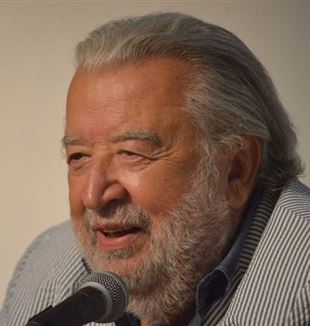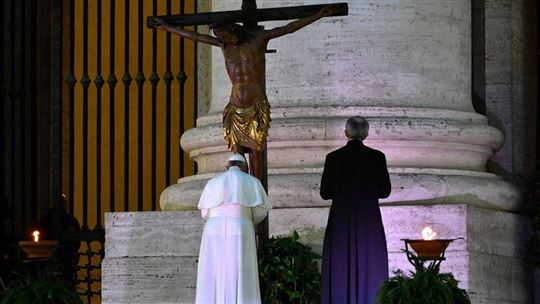
Pupi Avati: "Me, fear and being able to say ‘I do not know’”
A letter to RAI asking to bet on "beauty", to seize the "the opportunity presented to us during this tragedy." Isolation during the emergency, his story, his relationship with his wife, the Pope. The great Italian director recounts what he is discovering."For the first time, I miss being embraced more than being able to embrace.” The "nostalgia of being a son", the strong sense of an event that asks for change, in this "endless silence, sacred and mysterious, that makes us understand our smallness." This is how director Pupi Avati talked about what he is living, in an open letter to RAI (Italian broadcasting company), in which he asked to seize the opportunity, to be ambitious, to distort the tv schedules and to bet on beauty. Not as a parenthesis, but rather so that “we are more aware” when the emergency has passed.
His appeal "had more resonance than all my films put together". But it did not bother him, on the contrary, it "amazed and moved me. Because that little letter I wrote resembles the beauty of people. And I just wanted to say that the opportunity presented to us in this tragedy must be seized."
How have you live the eruption of the emergency and what have you seen, in these weeks, in our society?
I can only speak for myself. What happened to me and my family. I immediately perceived one thing, that concern was inversely proportional to exposure to risk. My wife and I should have been more afraid, because, from the beginning, it was clear that the people who would be most affected were the elderly…and I am eighty-one years old. We were also affected by it closely, because my son and his family got sick and it was dramatic. But amongst us, the young people were the most frightened. The younger people are, the more afraid they are.
Different generations...
Yes, we were not educated in the illusion of “immortality”. And we have lived very similar circumstances. I was young during the Second World War, but it marked my whole life. That sense of what is sacred, that extreme sensitivity, that waiting, not being able to go out... So many aspects of a collective drama. Then, personally, I went through a devastating heart attack. I was 50 years old. In the ambulance, I heard the doctor say to the driver: "Why are you hurrying? You will not make it.” You are close to death. And when you get out of intensive care, you are enriched. I found myself with one less piece of heart and with a completely revolutionized conception of life: what I had based everything on had been questioned. You see yourself changed, improved, because you have been through pain and you have another awareness.
Did everything then go back to how it was before?
I cannot say how for how long it lasted, I know I lived differently for a while. But the big problem is, going back. Like now, when, on television, I hear the inexhaustible hum of resentment and exploitation once again…It is as if we have already moved past the problem. But we have not. At the beginning of the pandemic, I heard some of our great thinkers and experts say: "I do not know." I do not know! See, I trust you, because you finally say, "I do not know."
What do you mean?
Everything that is happening throws our smallness in our faces, our fragility, our vulnerability, our limits, to the extreme limit, and that is good, because we have forgotten it. But it pains me that it does not last very long, and we return to criticizing, to being scandalized. We lived in a very mediocre way until the virus came. Now, we are faced with atrocious dramas, like that daughter who does not know where her father's ashes are, who obviously could not see her father die; we have regained an awareness, the realization of the preciousness of everything we have received, which we do not know how to recognize…And yet, it seems that even this life "lesson" is not enough for us.
Among the limitations that reality throws in our faces, there is also an inability to become aware by our own strength, by ourselves.
But we have a responsibility in front of the opportunity that is given to us. I believe that the most appropriate verb is: to repent. That is what I am trying to do.
How?
You could say that it is about seconding a new gaze. It happens to me with my wife. You know, we have been married for 52 years. Standing next to her 24 hours a day, like I never have in life, I am discovering someone I do not know. But who is this woman? She amazes me. She has extraordinary energy. She will do anything. And she yells at me all the time...I do not do one thing right! (he laughs) But I really like this. I realize how much I need this. It is about seconding this gaze. And reassessing things. Even the grocery... It is about re-evaluating everything. It is as if this period in time came to tell us: you have not understood anything. It is a time given to us. We cannot go back to the way we were before. And in any case, there is a disproportion between what I hear in public debate and people’s authentic awareness, who are faced with the problem of survival, both physical and economic, and who suddenly rediscover sacredness. They rediscover that man, dressed in white, in front of the big empty square.
The Pope on the evening of March 27. You said: "Beyond that square, I know that there will be nothing more moving. It is one of the rare things you see and for which you have no words."
It is one of the images that will remain with me forever. Like the image of the military trucks carrying the coffins of our dead. Both remind me of how small we are, how little we know. Edgar Allan Poe said that everything that exists can be described with words. He was wrong. What I lived in front of the Pope that night, cannot. And I had my objections towards this Pope as well. But his presence, his physical fragility, his disproportion even in liturgical gestures, his difficulty in raising the monstrance, in walking, in breathing...
Why were you struck by him?
Because everything about him was a plea towards God. A plea for help for something that transcends us. He told us that man cannot do it alone, he swept away the proud secular proselytism with which we have soaked the world's communication. I believe that anyone, even those who had never considered the hypothesis, opened themselves to that mysterious, moving, solemnity.
Like you.
I want to believe even if I do not believe. I do not think you can believe 24 hours a day. To believe you have to be visited by a grace. And I experience it, when I feel mysteriously loved, at certain moments, precise, but inexplicable. Suddenly I find myself loved, perhaps in the subway. And I feel great gratitude. In that moment I have faith. It also happens to me in the face of injustice. I have been very lucky in life, but I have seen people born, live and die in injustice. In front of them, I demand that God be there. I go to church and ask God to exist. There are places, intimate, where human laws, measures, politics, courts... can do nothing. Who compensates a life of suffering? That is why I cannot stand that there are people who do their best to convince us that we should not believe.
Read also - Antonio Polito: fear and presence
Has this dramatic period deepened your faith?
It has accentuated the very strong feeling that I have, that in growing old – in unveiling myself, in discovering what life really is, because growing old is this - a separation of paths has opened up: between my body, increasingly reticent about all the things I ask it to do, and my self. My ego has become detached. It is perhaps more lucid than it has ever been. And I believe, though I do not know how, that it will transcend me.
#Coronavirus